Edu-Art – un ciclu de prezentări și ateliere practice la BUNKER / a cycle of presentations and workshops at BUNKER, 7 februarie – 29 martie 2017
Edu-Art – un ciclu de prezentări și ateliere practice la BUNKER / a cycle of presentations and workshops at BUNKER, 7 februarie – 29 martie 2017
Lectură lentă cu Alex Cosmescu / Медленное чтение / Slow reading
7 februarie – 31 mai, 2017
Facultatea Arte Plastice, Blocul III, str. 31 August 1989, nr. 137, Chișinău
– – – scroll down for English version – – –
– – – читай ниже на русском – – –
RO
Edu-Art (educaţie artistică non-formală pentru o generaţie de tineri implicați social şi integrați din punct de vedere profesional)
Scopul proiectului este formarea unei generații active de artiști din punct de vedere civic și pregătirea ei pentru a se realiza profesional în plan național și internaţional.
Proiectul Edu-Art îşi propune să ofere tinerilor artişti suport metodologic şi practic pentru lucrul artistic într-o lume aflată în proces de transformare sub presiunea unor factori de ordin global (cerințele înalte de acces pe piața muncii și competitivitatea existenta în cîmpul artistic, migrația masivă pe plan internațional, precaritatea lucrului în domeniul culturii etc.) şi pregătirea acestora pentru competiţia profesională internaţională.
Program
A vedea / a descrie / a gândi
31 mai 2017, ora 15:00-17:30
BUNKER / Facultatea Arte Plastice / Academia de Muzică, Teatru și Arte Plastice (blocul III, str. 31 August 1989, nr. 137, Chișinău)
În cadrul acestei întâlniri, vom lucra cu o serie de deprinderi de analiză, descriere și dialog, pornind de la observarea atentă a unei lucrări artistice.
Vom exersa în primul rând capacitatea – care funcționează ca bază pentru obținerea unui consens cu privire la o operă de artă – de a exprima într-un mod simplu o descriere a aspectului perceptibil al lucrării respective.
Apoi, pornind de la descrierile efectuate, vom explora împreună modul în care ne putem pune de acord cu privire la o interpretare a unei lucrări pe baza analizei a ce este efectiv experimentat în contactul cu ea.
Respectiv, a doua abilitate exersată va fi conceptualizarea, dar o formă de conceptualizare ancorată în experiența însăși.
Este vorba de abilități specific filosofice, care presupun o reflecție asupra experienței și asupra a ceea ce este întâlnit în experiență, servind astfel drept bază pentru legitimarea unui fel de a vorbi despre ceea ce ne apare experiențial.
A vedea / a descrie / a gândi
24 mai 2017, ora 15:00-17:30
BUNKER / Facultatea Arte Plastice / Academia de Muzică, Teatru și Arte Plastice (blocul III, str. 31 August 1989, nr. 137, Chișinău)
Pentru o mare parte din public, artele vizuale oferă doar un prilej de a te uita la ceva. Uneori, se întâmplă că un aspect al ceea ce vedem ne afectează emoțional – și vorbim în termeni de „mi-a plăcut / nu mi-a plăcut” sau „frumos / asta nu-i artă”. Cu atât mai mult dacă e vorba de artă contemporană. În cadrul acestui atelier, vom explora modurile în care putem exprima în limbaj ceea ce vedem atunci când observăm atent o lucrare artistică și felul în care, eventual, îi putem atribui o semnificație pe baza acestei observări / descrieri. Faptul că această atribuire de semnificație apare pe baza observării face posibilă, ulterior, o discuție responsabilă despre felul în care înțelegem ceea ce vedem și trecerea de la nivelul descrierii la cel al conceptualizării. Adică să folosim ceea ce vedem drept pretext pentru a gândi.
Lectură lentă
26 aprilie 2017, ora 15:00-17:30
BUNKER / Facultatea Arte Plastice / Academia de Muzică, Teatru și Arte Plastice (blocul III, str. 31 August 1989, nr. 137, Chișinău)
Una dintre practicile desfășurate de majoritatea celor care au de a face cu arta este lectura. Fie că este vorba de texte teoretice, care încearcă să abordeze un fenomen, fie de statements ale unor artiști cu privire la lucrările lor, fie lucrarea însăși se prezintă drept text, avem de a face continuu cu ceva ce trebuie citit, înțeles, eventual interpretat. În acest context, este necesară antrenarea atenției față de implicitul textului: o practică de lectură care încearcă să proiecteze cât mai puțin asupra cuvintelor care ni se prezintă, deschizându-se față de ele și explorând sensurile care pot fi generate. În cadrul acestei întâlniri, va fi explorat, într-o manieră experiențială, modul în care se poate efectua – într-un context comunitar / colaborativ – o asemenea practică a lecturii atente și deschise la posibilitățile semantice implicite într-un text cu multiple straturi de semnificație.
A vedea / a descrie / a gândi
29 martie 2017, ora 15:00-17:30
BUNKER / Facultatea Arte Plastice / Academia de Muzică, Teatru și Arte Plastice (blocul III, str. 31 August 1989, nr. 137, Chișinău)
Pentru o mare parte din public, artele vizuale oferă doar un prilej de a te uita la ceva. Uneori, se întâmplă că un aspect al ceea ce vedem ne afectează emoțional – și vorbim în termeni de „mi-a plăcut / nu mi-a plăcut” sau „frumos / asta nu-i artă”. Cu atât mai mult dacă e vorba de artă contemporană. În cadrul acestui atelier, vom explora modurile în care putem exprima în limbaj ceea ce vedem atunci când observăm atent o lucrare artistică și felul în care, eventual, îi putem atribui o semnificație pe baza acestei observări / descrieri. Faptul că această atribuire de semnificație apare pe baza observării face posibilă, ulterior, o discuție responsabilă despre felul în care înțelegem ceea ce vedem și trecerea de la nivelul descrierii la cel al conceptualizării. Adică să folosim ceea ce vedem drept pretext pentru a gândi.
Lectură lentă
22 martie 2017, ora 15:00-17:30
BUNKER / Facultatea Arte Plastice / Academia de Muzică, Teatru și Arte Plastice (blocul III, str. 31 August 1989, nr. 137, Chișinău)
Una dintre practicile desfășurate de majoritatea celor care au de a face cu arta este lectura. Fie că este vorba de texte teoretice, care încearcă să abordeze un fenomen, fie de statements ale unor artiști cu privire la lucrările lor, fie lucrarea însăși se prezintă drept text, avem de a face continuu cu ceva ce trebuie citit, înțeles, eventual interpretat. În acest context, este necesară antrenarea atenției față de implicitul textului: o practică de lectură care încearcă să proiecteze cât mai puțin asupra cuvintelor care ni se prezintă, deschizându-se față de ele și explorând sensurile care pot fi generate. În cadrul acestei întâlniri, va fi explorat, într-o manieră experiențială, modul în care se poate efectua – într-un context comunitar / colaborativ – o asemenea practică a lecturii atente și deschise la posibilitățile semantice implicite într-un text cu multiple straturi de semnificație.
Arta angajată și limitele politice ale intervenței artistice. Atelier de performance și intervenție în spațiul public – atelier condus de Veda POPOVICI
8 februarie 2017, ora 13:00-16:00
BUNKER / Facultatea Arte Plastice / Academia de Muzică, Teatru și Arte Plastice (blocul III, str. 31 August 1989, nr. 137, Chișinău)
Acest atelier va urmări cât de ofensivă și cât de inofensivă este arta ce-și asumă subiecte socio-politice. Intervenția într-un tip de spațiu public bazată pe o metodologie situaționistă și inspirată de conceptul de sculptură socială (J. Beuys) poate provoca și disturba o ordine normativă sau poate întări idei și mentalități dominante. Atunci când asemenea intervenții se reclamă de la o poziție angajată, politică, ambiguitatea aceasta se disipă. Pe baza experienței concrete a participanților cât și pornind de la câteva exemple de astfel de intervenții artistice, atelierul oferă cadrul explorării limitelor artei angajate sau politice în contextul specific al Chișinăului.
Doritorii de a lua parte la programul atelierului sînt rugați să expedieze un mesaj de motivare însoțit de datele dvs. de contact (email, telefon) la următoarea adresă: info@oberliht.org, pînă la data de 7 februarie 2017.
Precarii de serviciu. Imperativele coloniale ale sistemului occidental de artă și propunerile artei angajate în Europa de Est – o prezentare publică de Veda POPOVICI
7 februarie 2017, ora 16:00
BUNKER / Facultatea Arte Plastice / Academia de Muzică, Teatru și Arte Plastice (blocul III, str. 31 August 1989, nr. 137, Chișinău)
După 1989, artistele și artiștii din Europa de Est se văd în poziția de a-și performa identitatea est-europeană unui sistem de artă ce se vedea parte din tabăra câștigătoare a Războiului Rece. Raportul asimetric astfel format nu era însă nou ci continua o mai veche relație de colonialitate ce provine de la formarea statelor naționale. Până în prezent, lucrurile s-au schimbat prea puțin: tot avem acces limitat la formare profesională, primim remunerație mai mică dar ni se cere o „ținută” profesionistă înaltă. Și aceasta pentru că Europa de Est este considerată în continuare în „tranziție”, niciodată suficient de dezvoltată și avansată. Această prelegere va analiza atât reacțiile specifice ale unor artiști contemporani la imperativele coloniale dar și posibilitățile eliberatoare pe care arta angajată politic le oferă.
– – –
Alex Cosmescu, cercetător științific la Academia de Științe a Moldovei. Lucrează în câmpul fenomenologiei și al analizei discursului. Autor al unui volum de poezie (un spațiu blând, care mă primește cum m-ar îmbrățișa, Cartier, 2013). Colaborări în cadrul proiectelor Oberliht și [ksa:k].
Veda Popovici (1986, Timișoara) lucrează ca artistă politică, teoreticiană angajată și activistă locală. Interesele sale traversează aceste câmpuri cuprinzând intervenții în politicile reprezentării identităților colective, practici feministe și decoloniale și in/ofensivitatea politică a artei. Angajamentele sale politice se regăsesc în lupte locale pentru justiție locativă și organizarea comunitară a vieții și muncii. De curând, și-a finalizat teza de doctorat despre naționalism în arta din România anilor 70-80 și a ținut un curs bazat pe gândire decolonială despre artă și cultură în context românesc, ambele la Universitatea Națională de Artă din București. Trăiește și lucrează în București.
– – –
EDU-ART este un program organizat de Asociația Oberliht în colaborare cu Academia de Muzică, Teatru și Arte Plastice, Facultatea Arte Plastice, și este susținut de Ministerul Educației, Culturii și Cercetării al Republicii Moldova. Scopul acestui program este de a introduce noi module educaționale în sfera educației artistice din Moldova și de a familiariza publicul cu noile tendințe în artă din Moldova și din regiune.
EN
Edu-Art (non-formal artistic education for socially involved and professionally integrated young generation)
The aim of this project is to create a civically active generation of artists and to prepare them for the professional development on national and international level.The Edu-Art project aims to provide methodological and practical support to young artists for artistic work in a world undergoing transformation under the pressure of global factors (high labor market access and competition in the artistic field, massive migration on the international level, the precariousness of the work in the field of culture, etc.) and their preparation for the international professional competition.
Program:
Seeing / describing / thinking
May 31, 2017, 15:00-17:30
BUNKER / Faculty of Fine Arts / Academy of Music, Theater, and Fine Arts (3rd block, 137, 31st of August 1989 Street, Chisinau)
In this meeting, we will work on several skills of analysis, description, and dialogue, based on the attentive observation of an artwork.
The first ability we will train – which offers a foundation for consensus regarding an artwork – is expressing in simple terms a description of the perceptible aspect of that artwork.
Later, using as a starting point the descriptions that will be attempted, we will explore together ways in which we can be led to an agreement about an interpretation of an artwork based on the analysis of what is effectively experienced in the contact with it.
Accordingly, the second ability we will train will be conceptualization, but a form a conceptualization grounded in experience itself.
These skills are specifically philosophical: they presuppose a reflection on experience and on what is encountered in experience, offering thus a ground and legitimacy to a way of speaking about what appears experientially to us.
Seeing / describing / thinking
May 24, 2017, 15:00-17:30
BUNKER / Faculty of Fine Arts / Academy of Music, Theater, and Fine Arts (3rd block, 137, 31st of August 1989 Street, Chisinau)
For a great part of the audience, visual art offers just an occasion for looking at something. Sometimes, an aspect of what we see affects us emotionally – and we speak in terms of “I liked it / I didn’t like it” or “beautiful / this isn’t art”. Even more so if it is contemporary art. During this workshop, we will explore ways of expressing in language what we see when we observe attentively an artwork and, possibly, of attributing it a meaning based on this observing / description. The fact that this meaning attribution appears based on observing enables, eventually, an accountable conversation about ways in which we understand what we see, and a transition from the level of description to that of conceptualization. In other words, using what we see as an occasion for thinking.
Slow reading
April 26, 2017, 15:00-17:3026
BUNKER / Faculty of Fine Arts / Academy of Music, Theater, and Fine Arts (3rd block, 137, 31st of August 1989 Street, Chisinau)
One of the practices carried on my most people who have to do with art is reading. In the case of theoretical texts, that attempt to treat about a phenomenon, of artists’ statements about their own work, or of a work that presents itself as a text, we have to do with something to be read, understood, maybe interpreted. In this context, a training of attention towards what is implicit in the text becomes necessary: a reading practice that tries to project as little as possible on the words that present themselves to us, opening towards them and exploring the possible meanings that can be generated. During this meeting, we will explore, in an experiential manner, the way in which – in a communal / collaborative context – we can carry on this practice of an attentive reading, open to the semantic possibilities implicit in a text with multiple signification layers.
Seeing / describing / thinking
March 29, 2017, 15:00-17:30
BUNKER / Faculty of Fine Arts / Academy of Music, Theater, and Fine Arts (3rd block, 137, 31st of August 1989 Street, Chisinau)
For a great part of the audience, visual art offers just an occasion for looking at something. Sometimes, an aspect of what we see affects us emotionally – and we speak in terms of “I liked it / I didn’t like it” or “beautiful / this isn’t art”. Even more so if it is contemporary art. During this workshop, we will explore ways of expressing in language what we see when we observe attentively an artwork and, possibly, of attributing it a meaning based on this observing / description. The fact that this meaning attribution appears based on observing enables, eventually, an accountable conversation about ways in which we understand what we see, and a transition from the level of description to that of conceptualization. In other words, using what we see as an occasion for thinking.
Slow reading
March 22, 2017, 15:00-17:30
BUNKER / Faculty of Fine Arts / Academy of Music, Theater, and Fine Arts (3rd block, 137, 31st of August 1989 Street, Chisinau)
One of the practices carried on my most people who have to do with art is reading. In the case of theoretical texts, that attempt to treat about a phenomenon, of artists’ statements about their own work, or of a work that presents itself as a text, we have to do with something to be read, understood, maybe interpreted. In this context, a training of attention towards what is implicit in the text becomes necessary: a reading practice that tries to project as little as possible on the words that present themselves to us, opening towards them and exploring the possible meanings that can be generated. During this meeting, we will explore, in an experiential manner, the way in which – in a communal / collaborative context – we can carry on this practice of an attentive reading, open to the semantic possibilities implicit in a text with multiple signification layers.
Engaged Art and the Political Limits of Artistic Intervention. Performance and Public Space Intervention Workshop – workshop led by Veda POPOVICI
February 8, 2017, 13:00-16:00
BUNKER / Faculty of Fine Arts / Academy of Music, Theater, and Fine Arts (3rd block, 137, 31st of August 1989 Street, Chisinau)
This workshop will contemplate how harmful or harmless art that assumes socio-political aims can be. Intervening in a type of public space, based on situationist methodology and inspired by the concept of social sculpture (J. Beuys) may challenge and disturb a normative order or may strengthen dominant ideas and mentalities. When this kind of intervention stems from a politically engaged position, the ambiguity dissipates. Starting from the participants’ concrete experiences, as well as from several examples of artistic interventions of this type, the workshop offers a framework for exploring the limits of engaged or political art in Chisinau’s specific context.
Those willing to participate in the workshop are asked to send a motivation message, together with their contact information (email, telephone number), to the following address: info(a)oberliht.org until February 7, 2017.
Innately Precarious. Colonial Imperatives of the Western Art World and the Promises of Politically Engaged Art in Eastern Europe – a public presentation by Veda POPOVICI
February 7, 2017, 16:00
BUNKER / Faculty of Fine Arts / Academy of Music, Theater, and Fine Arts (3rd block, 137, 31st of August 1989 Street, Chisinau)
Since 1989, Eastern European artists are distributed in the role of performing their Eastern European identity in front of an art world that, after the Cold War, saw itself as a part of the winning camp. The unequal relationship formed in this manner was, however, not new: it continued an older colonial dynamic dating back to the formation of national states. Until now, things have changed too little: we still have limited access to professional training, we are paid less, but are required high professional “standards”. Eastern Europe is still considered as being a territory “in transition”, never developed and advanced enough. This lecture will tackle both the particular reactions of contemporary artists facing colonial imperatives and the liberating possibilities offered by politically engaged art.
– – –
Alex Cosmescu, research fellow at the Academy of Sciences of Moldova. He works in the fields of phenomenology and discourse analysis. Author of a poetry collection (a kind space, that receives me as if embracing me, Cartier, 2013). Collaborations as part of Oberliht and ksa:k projects.
Veda Popovici (1986, Timisoara) works as a political artist, engaged theorist, and local activist. Her interests touch all these fields, including interventions in politics of representation of collective identities, feminist and decolonial practices, and political harmful-/harmlessness of art. Her political engagements are expressed in local struggles for tenants’ justice and communitarian organization of life and work. She has recently defended her PhD thesis on nationalism in Romanian art of the 1970s-80s and taught a course based on decolonial thinking about art and culture in Romanian context, both at the National University of Arts in Bucharest. She lives and works in Bucharest.
– – –
Edu-Art is a program organized by Oberliht Association in collaboration with Academy of Music, Theatre and Fine Arts, Faculty of Fine Arts, with the support of Ministry of Education, Culture and Research of the Republic of Moldova. The program aims to introduce new educational modules in the artistic education curricula and to familiarize the publics with new tendencies in art from Moldova and from the region.
RU
Edu-Art (неформальное художественное образование для поколения социально и профессионально интегрированных молодых людей)
Целью проекта является формирование поколения художников, граждански активных и подготовки их для достижения профессионального национального и международного уровня. Проект Edu-Art направлен на оказание методической и практической поддержки молодым художникам для художественной работы в мире, подвергающемся трансформации под давлением глобальных факторов (высокий доступ на рынок труда и конкуренция в художественной сфере, массовая миграция на международном уровне, нестабильность работы в области культуры и т. д.) и их подготовка к международному профессиональному соревнованию.
Программа
Увидеть/ Описать/ Обдумать
24 май 2017, 15:00-17:30
BUNKER / Facultatea Arte Plastice / Academia de Muzică, Teatru și Arte Plastice (blocul III, str. 31 August 1989, nr. 137, Chișinău)
Для значительной части аудитории визуальное искусство предоставляет только повод для того, чтобы посмотреть на что-то. Иногда аспект того, что мы видим, влияет на нас эмоционально – и мы выражаемся такими терминами как «мне понравилось / мне не понравилось» или «красиво / это не искусство». Особенно, если речь идет о современном искусстве. Во время этого семинара мы рассмотрим способы словесного описания того, что мы видим, когда внимательно наблюдаем за работой и, возможно, приписываем ей значение, основанное на этом наблюдении / описании. Тот факт, что это значение атрибуции появляется на основе наблюдения, дает нам возможность, в конечном счете, в ходе дискуссии понять о способах восприятия того, что мы видим, и перехода от уровня описания к понятию концептуализации. Другими словами, использовать то, что мы видим, как повод для размышлений.
Медленное чтение
26 апреля 2017, 15:00-17:30
BUNKER / Facultatea Arte Plastice / Academia de Muzică, Teatru și Arte Plastice (blocul III, str. 31 August 1989, nr. 137, Chișinău)
Одной из практик, осуществляемых большинством тех, кто имеет дело с искусством, является чтение. Будь это теоретические тексты, которые пытаются раскрыть какой-либо феномен, высказывания художников о своей работе или же сама работа представленная в виде текста, мы постоянно имеем дело с чем-то, что необходимо прочесть, понять, возможно интерпретировать. В связи с этим, требуется привлечь внимание к тексту по умолчанию: практике чтения, которая сосредоточена, не столько на словах, представленных нам, сколько на раскрытии их и исследовании значений, которые могут быть произведены. В ходе встречи мы опытным путем исследуем способ, – в общем/совместном контексте, с помощью которого может осуществляться практика такого внимательного чтения, открытого для смысловых возможностей текста с несколькими слоями значений.
Увидеть/ Описать/ Обдумать
29 марта 2017, 15:00-17:30
BUNKER / Facultatea Arte Plastice / Academia de Muzică, Teatru și Arte Plastice (blocul III, str. 31 August 1989, nr. 137, Chișinău)
Для значительной части аудитории визуальное искусство предоставляет только повод для того, чтобы посмотреть на что-то. Иногда аспект того, что мы видим, влияет на нас эмоционально – и мы выражаемся такими терминами как «мне понравилось / мне не понравилось» или «красиво / это не искусство». Особенно, если речь идет о современном искусстве. Во время этого семинара мы рассмотрим способы словесного описания того, что мы видим, когда внимательно наблюдаем за работой и, возможно, приписываем ей значение, основанное на этом наблюдении / описании. Тот факт, что это значение атрибуции появляется на основе наблюдения, дает нам возможность, в конечном счете, в ходе дискуссии понять о способах восприятия того, что мы видим, и перехода от уровня описания к понятию концептуализации. Другими словами, использовать то, что мы видим, как повод для размышлений.
Медленное чтение
22 марта 2017, 15:00-17:30
BUNKER / Facultatea Arte Plastice / Academia de Muzică, Teatru și Arte Plastice (blocul III, str. 31 August 1989, nr. 137, Chișinău)
Одной из практик, осуществляемых большинством тех, кто имеет дело с искусством, является чтение. Будь это теоретические тексты, которые пытаются раскрыть какой-либо феномен, высказывания художников о своей работе или же сама работа представленная в виде текста, мы постоянно имеем дело с чем-то, что необходимо прочесть, понять, возможно интерпретировать. В связи с этим, требуется привлечь внимание к тексту по умолчанию: практике чтения, которая сосредоточена, не столько на словах, представленных нам, сколько на раскрытии их и исследовании значений, которые могут быть произведены. В ходе встречи мы опытным путем исследуем способ, – в общем/совместном контексте, с помощью которого может осуществляться практика такого внимательного чтения, открытого для смысловых возможностей текста с несколькими слоями значений.
– – –
Алекс Космеску, научный сотрудник Академии наук Молдовы. Он работает в области феноменологии и анализа дискурса. Является автором сборника стихов (un spațiu blând, care mă primește cum m-ar îmbrățișa, Cartier, 2013). Принимает участие в проектах ассоциаций Oberliht и [KSA:K]
– – –
Edu-Art – это программа, организованная Ассоциацией Oberliht в сотрудничестве с Академией Музыки, Театра и Изобразительных Искусств, Факультетом Изобразительных Искусств, и поддерживается Министерством Образования, Культуры и Исследований Республики Молдова. Цель данного проекта состоит в том, чтобы внедрить новые образовательные модули в области художественного образования в Молдове и ознакомить общественность с новыми тенденциями в искусстве Молдовы и ее регионов.

Tags : alex cosmescu, veda popovici
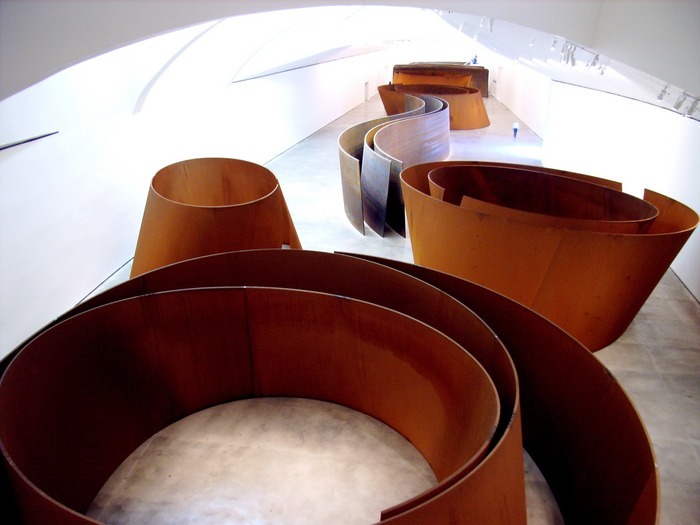
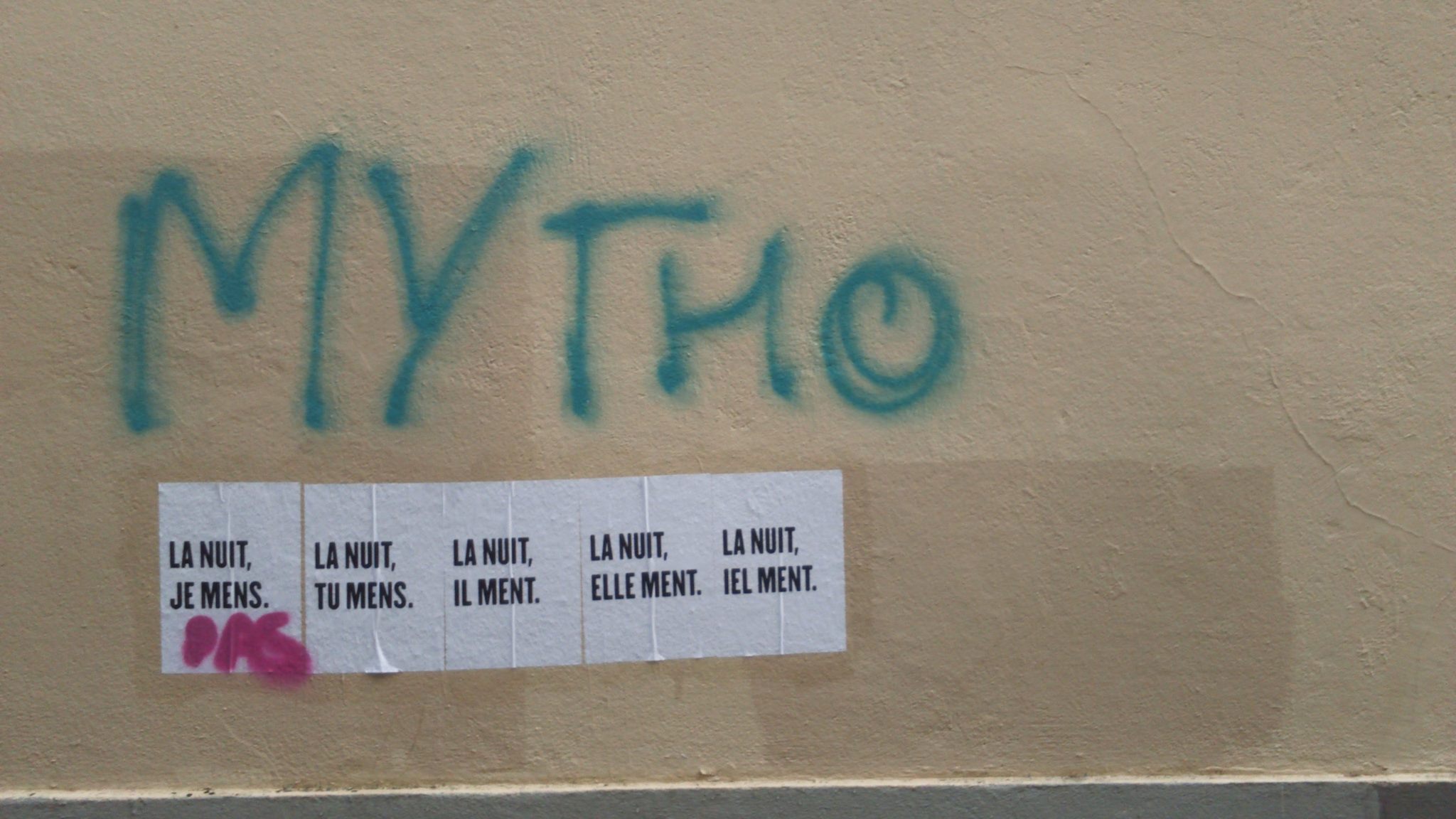
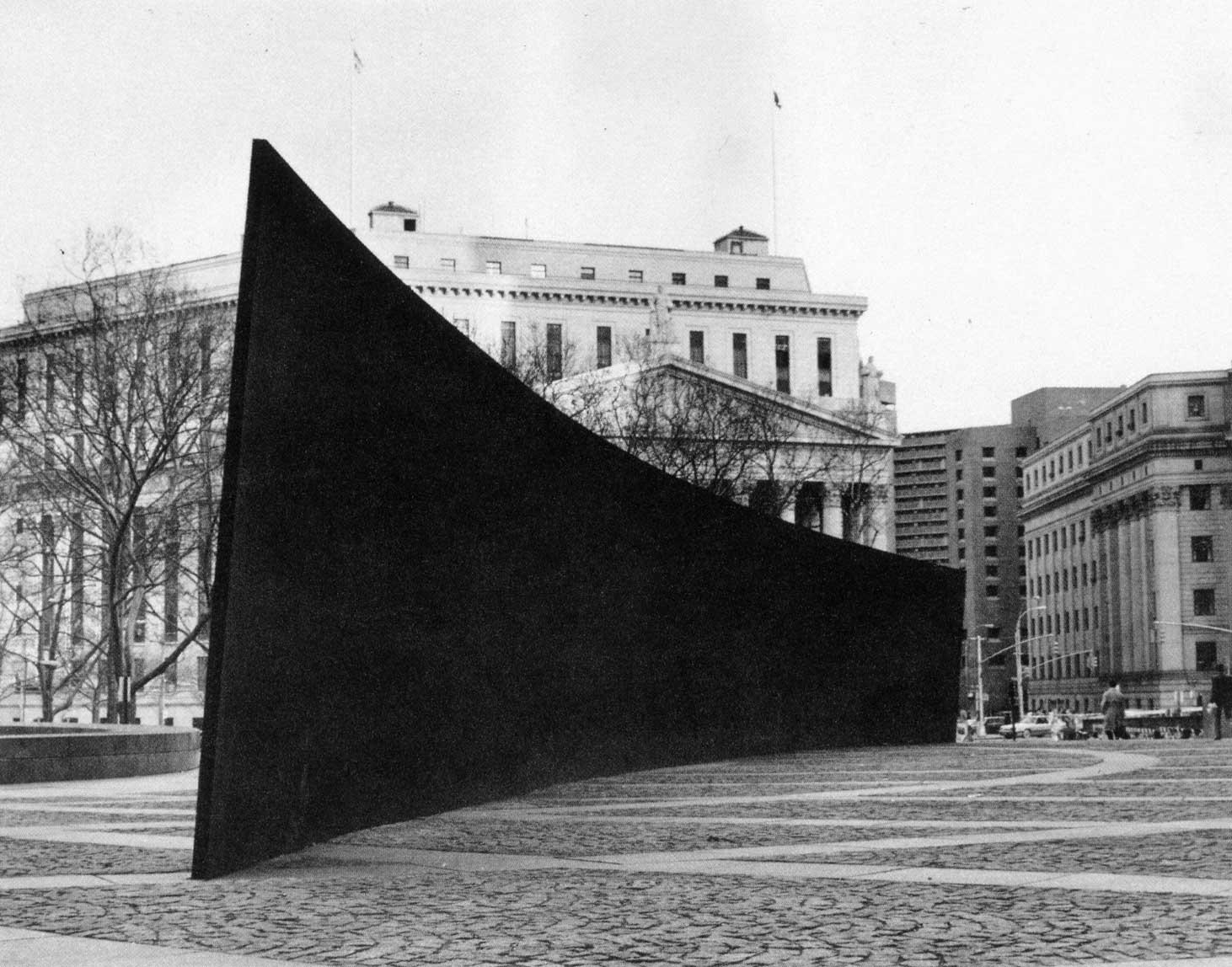
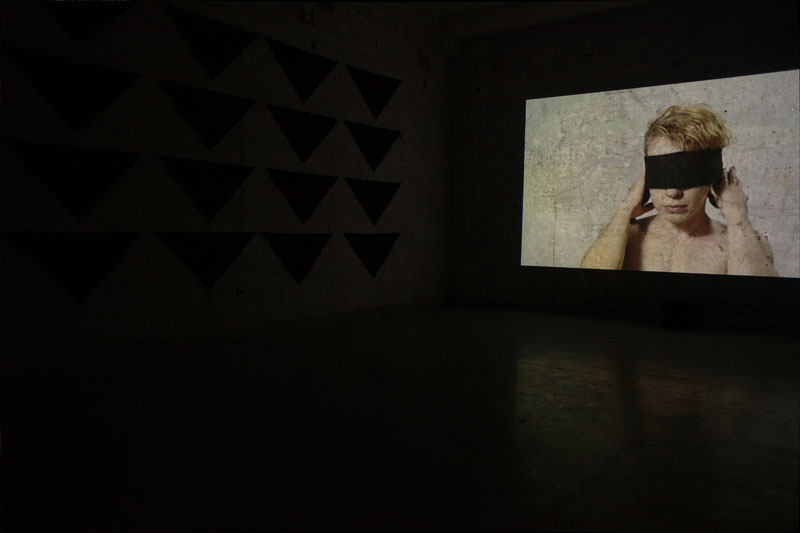
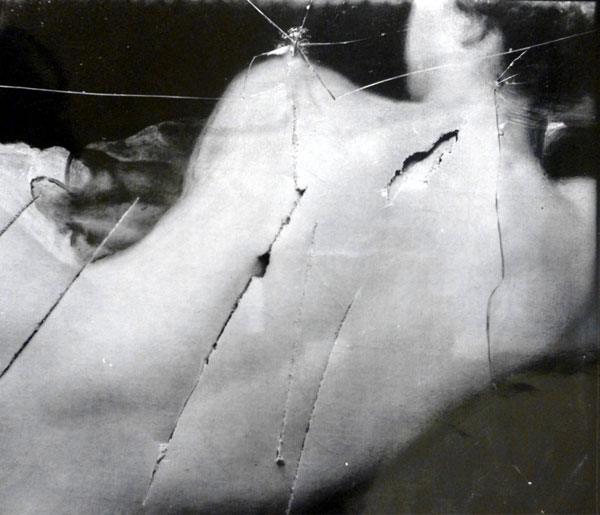
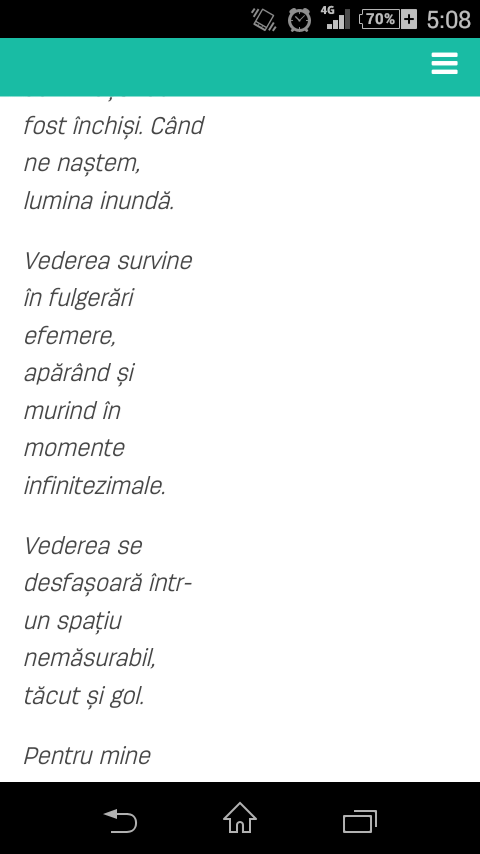

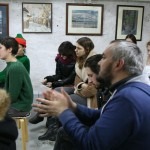
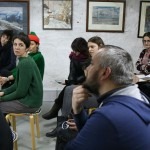
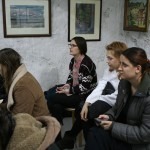
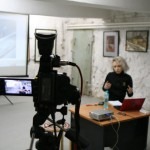
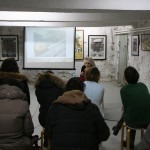
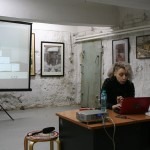
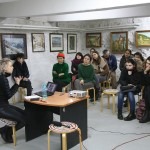
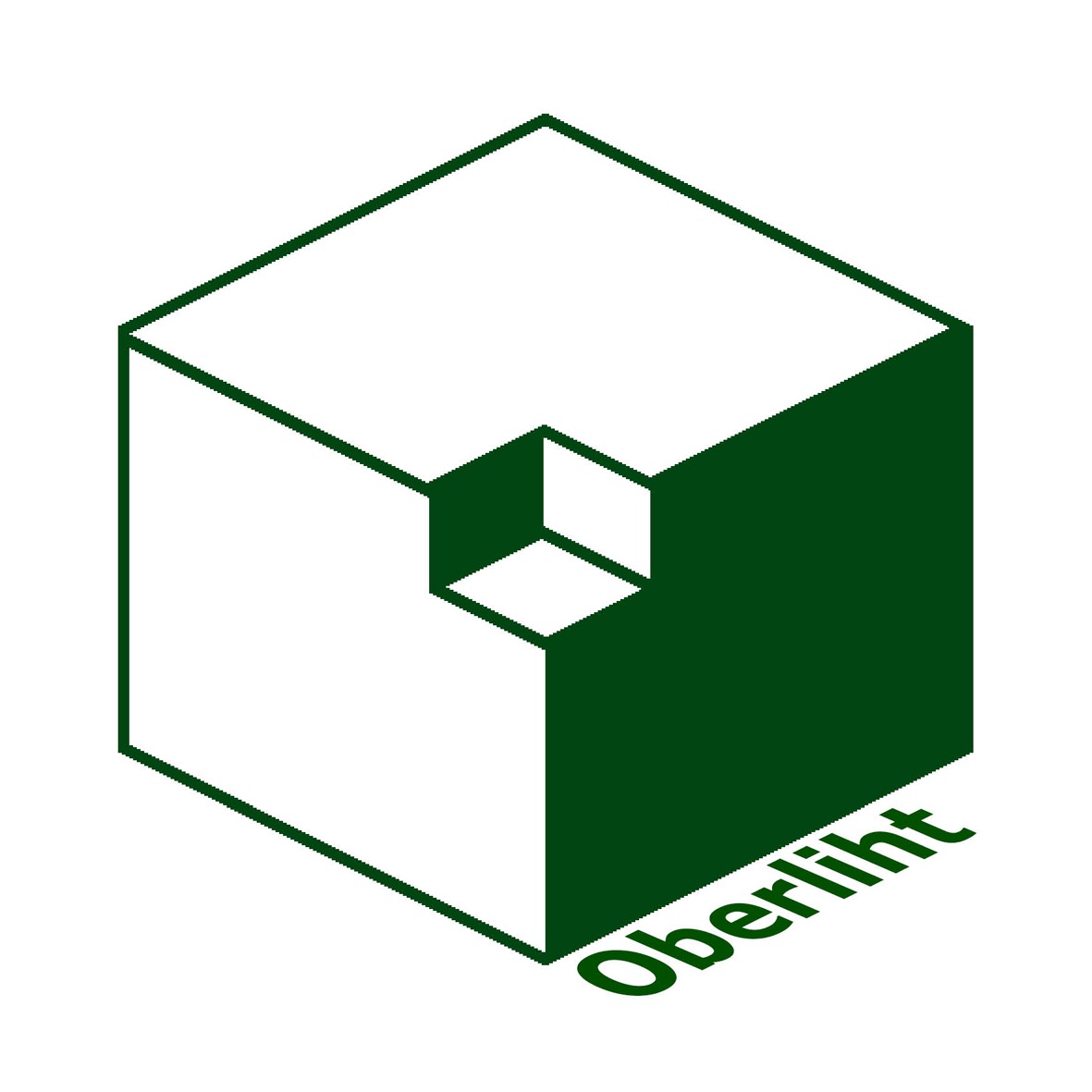

Leave a Reply